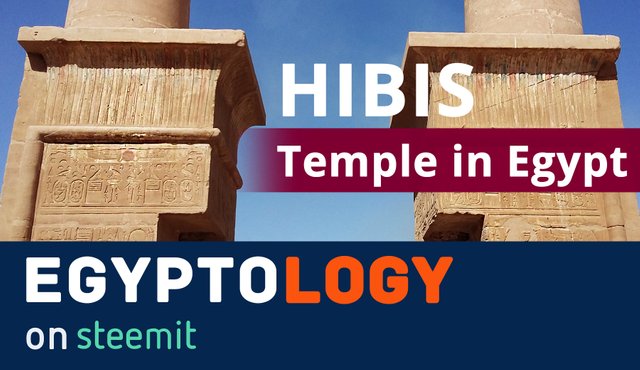
As I promised you I will keep on taking you with me on my journey through the oases of Egypt. Unfortunately, I got sick the last two weeks so you had to wait a bit longer for an update. Apologies for that again. But in this article, I will "kidnap" you to one of the most impressive temples of the Late Period (664–332 BC) up to the Greco-Roman Period (332 BC to 395 AD) of Ancient Egypt. You will get exclusive insights into an ancient monument that seems long forgotten but is – from an Egyptological perspective – of high importance.
City of Hibis
The Hibis Temple mentioned in this post is part of the Ancient Egyptian City of Hibis which derived from the egyptian word 𓉔𓃀𓏏𓊖 = Ḥb.t = (spoken: hebet) and means "the plough". It is located in the Kharga Oasis, the modern capital of the Egyptian governate Al-Wadi Al-Gadid (New Valley) in the western desert (Sahara). If you like to know more about this great oasis, feel free to read my previous post about Kharga. Until today nobody knows the exact scale of the ancient city of Hibis because no complete archaeological excavations were executed there, except the famous Hibis Temple and other smaller sites. In ancient times, mainly in the Late Period, this city was a highly frequented point within the desert trade routes between the Nile valley and Nubia (today Northern Sudan).
In Roman times (30 BC to 395 AD) Hibis is known to be the place of a Roman governor that published decrees of Roman law at the gates of the Hibis Temple, that in most cases regulated the administrative and economic issues of the area.
History of Research in Hibis
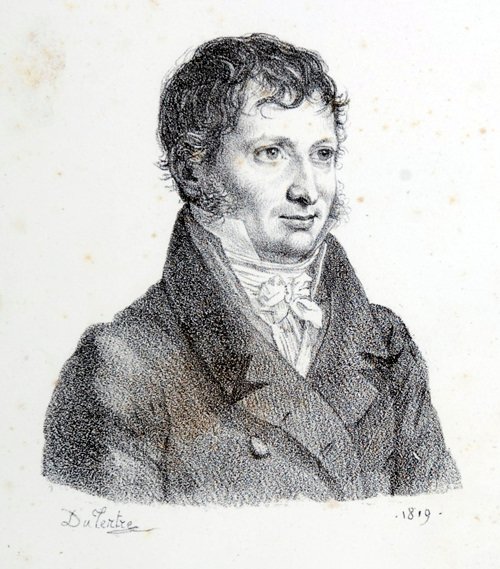
The Temple of Hibis at Kharga Oasis
The Hibis Temple, also called the Amun Temple of Hibis, was built probably in the 26th dynasty at the west bank of a lake where the Theban Triad (the three Gods Amun, Mut and Chons) were worshipped there. The lake doesn't exist anymore, but it is known that the temple was connected through a sphinx avenue with the quayside of the lake. The temple had also a huge temenos wall (surrounding the temple for protection). Later on, the temple was extended in size and decoration by the following rulers Dareios I, Dareios II, Hakoris, Nektanebos I. and/or Nektanebos II (all 28th to 30th dynasty). The Temple of Hibis is one of the best-preserved temples in the Kharga Oasis today and received a huge restoration treatment that makes visitors able to perceive the temple in its complete beauty.
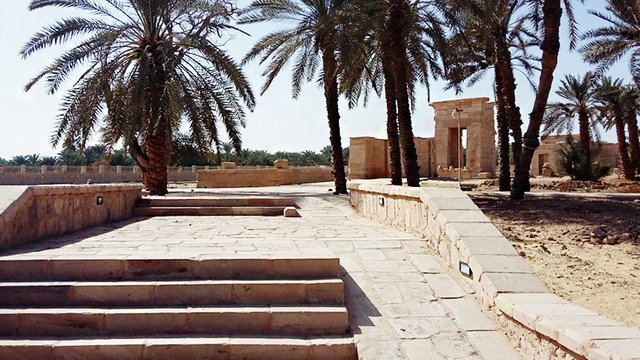
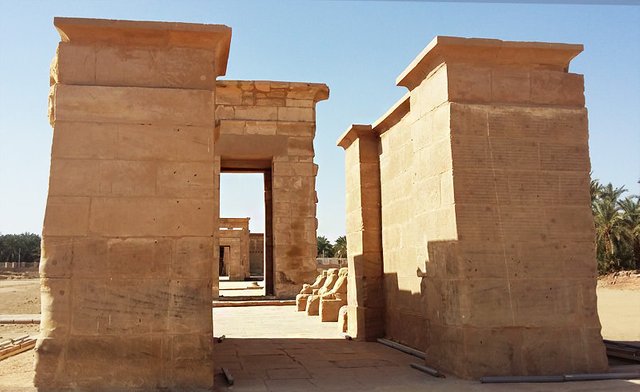
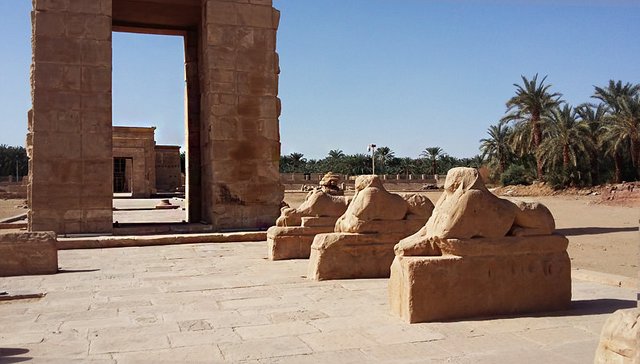
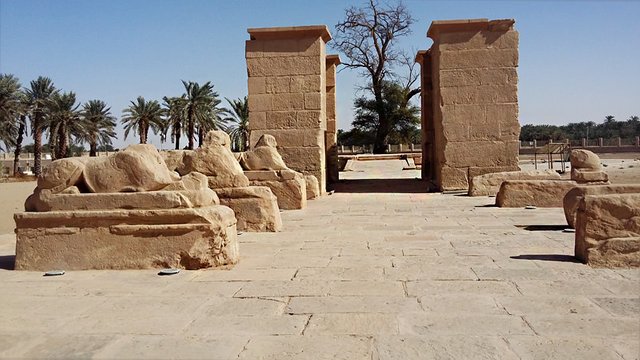
Alongside the sphinx avenue, there are three so-called pylons which is the scientific term for a special gate or entrance to a temple. A pylon is in general built in the same or at least in a similar way: two pillars left and right and a special-shaped architrave above, in most cases decorated with a winged sun-disk.
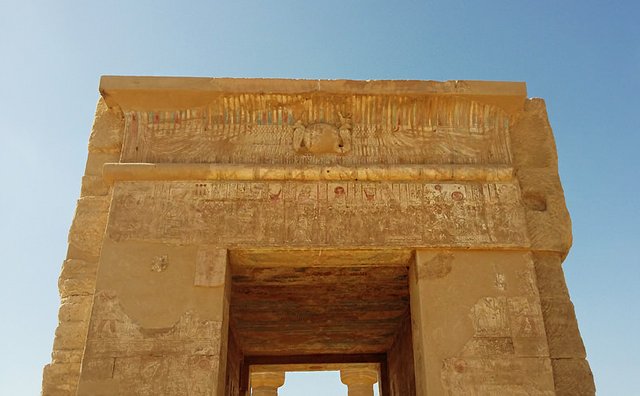
The complete temple measures 19 x 44 metres and is made of sandstone. Beside the sphinxes and the pylons, you can see a portikus (special entrance to the inner area), two pillar halls, the hall with the offering table and the holiest area – the sanctuary. To the left and the right within the offering hall, there are magazines (storage chambers) where the rituals were prepared.
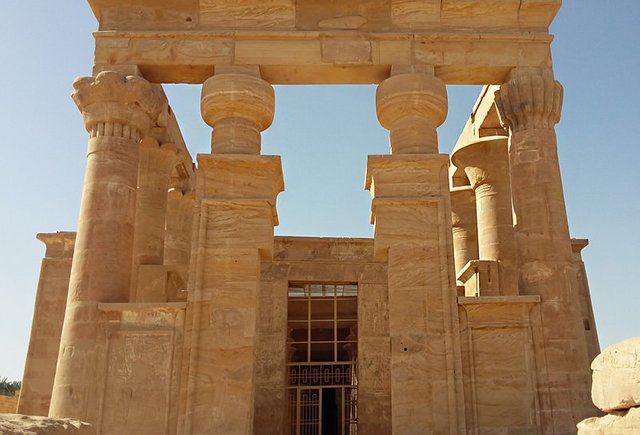
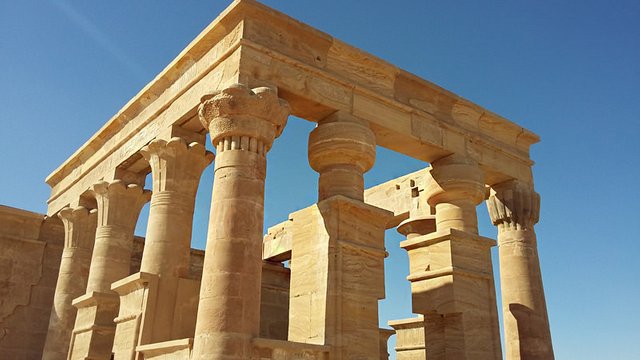
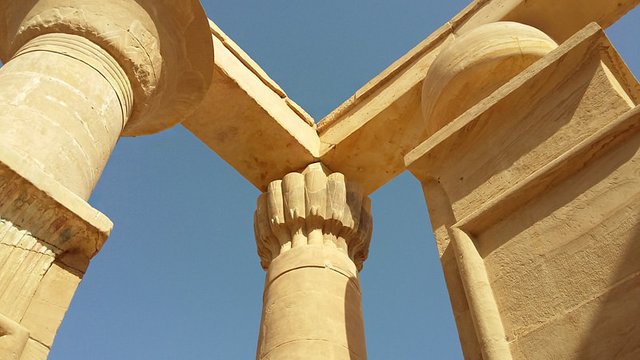
A very special decoration can be found at the backside of the first pillar hall: the falcon-headed, winged God Seth is fighting Apophis with a spear, the snake which was the greatest enemy of the Sun God Ra.
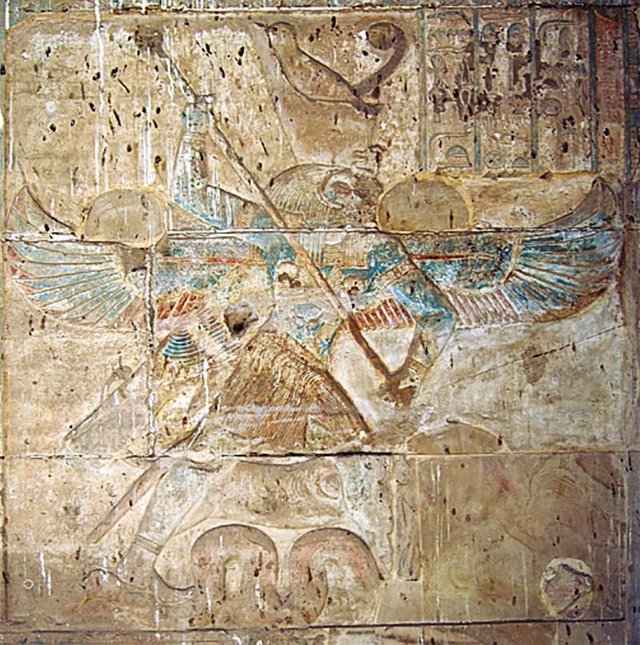
A very special feature is the rooftop temple that was dedicated to the God Osiris. As a visitor, you are allowed to "climb" up the very small doorsteps to the roof from which you can enjoy not only a fresh brize of air but also an amazing view around the area. If the weather is good you can even see the next temple, the Temple of Nadura, located just a few kilometres away from Hibis.
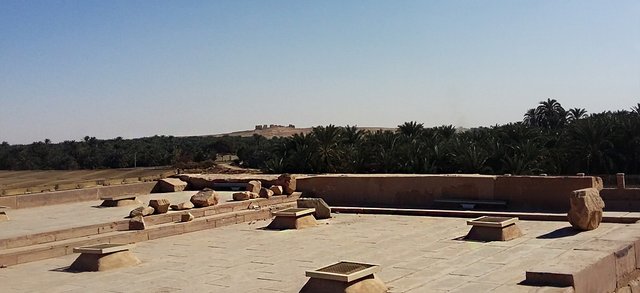
Next to the temple in the southwest within the area, a so-called Mammisi is located and can be visited as well. It is a quite undecorated small building but the speciality is the building itself. Mammisis are special facilities that were part of the offering rituals during processions in ancient times. They symbolized the birth myth of the Gods, mostly of the Triads which were often a mother-father-child constellation, and served as a chapel. Mammisis are known from the 8th century BC until the 4th century AD and were always located in a 90° angle to the procession way.
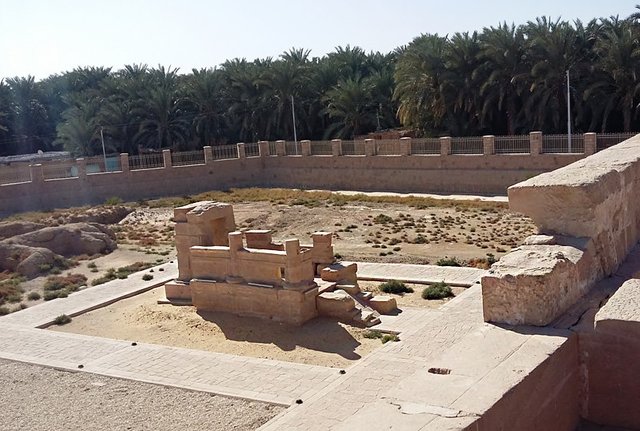
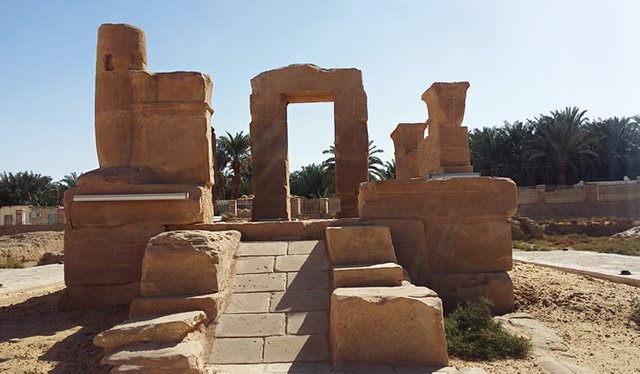
Thank you for reading!
Sources and further reading:
• Daumas, Francois, in: Lexikon der Ägyptologie. Bd. II, S. 462–475, s.v. Geburtshaus.
• Cruz-Uribe, Eugene: Hibis Temple Project, 1: Translations, commentary, discussions and sign list. San Antonio 1988.
• Winlock, Herbert E., Davies, Norman de Garis: The Temple of Hibis in el Khargeh Oasis, New York 1938–1953. (3 books)
• https://de.wikipedia.org/wiki/Hibis#Hibis-Tempel
• https://de.wikivoyage.org/wiki/Hībis
• https://en.wikipedia.org/wiki/Temple_of_Hibis
Images:
• Image used in the editorial picture: own photograph, taken Jan. 2018.
• Pic. 1: Source
• Pic. 2–9, 11-13: own photoraphs, taken Jan. 2018.
• Pic. 10: Source
Feel free to ask all the question of what you always wanted to know about Ancient Egypt. That’s my job and my passion. Let’s discuss your thoughts and ideas.

If you liked this article, please follow me on my blog @laylahsophia. I am a German Egyptologist writing about ancient and contemporary Egypt, history of science, philosophy and life.
Being A SteemStem Member
Downvoting a post can decrease pending rewards and make it less visible. Common reasons:
Submit
Wow! Egypt still looks like the ancient egypt. I thought it wouold have changed but nay! One of the oldest countries in the world looks just like the times of old.
Downvoting a post can decrease pending rewards and make it less visible. Common reasons:
Submit
That's absolutely true. In Egypt you can still feel the Ancient Times in every corner. Although the country changed through the centuries and the modern Egypt has rarely something to do with the pharaonic period, the cultural heritage is ubiquitous.
Downvoting a post can decrease pending rewards and make it less visible. Common reasons:
Submit
Wow! I love that...
Downvoting a post can decrease pending rewards and make it less visible. Common reasons:
Submit
Laylah read my post I posted.. on my page.. if you can please..
Downvoting a post can decrease pending rewards and make it less visible. Common reasons:
Submit
fantastisch @laylahsophia, vielen dank! jeden deiner posts verschlinge ich regelrecht. lg
Downvoting a post can decrease pending rewards and make it less visible. Common reasons:
Submit
MAn @pawos wollt auch sowas schreiben!!!!
Gibt auch echt keine anderen, die so gute Beiträge über diese Kultur hier haben!!!
@laylahsophia Mensch, da war ich einmal weniger online und hab deinen post fast übersehen, hättest du mir nicht den Wink auf Nachfrage gegeben :-)))
Toll!
Schade das du die nur auf englisch machst!
Denn viele aus der deutsch community, die an dem Thema Interesse haben, lesen halt lieber deutsch....oder hast du die auch auf deutsch??? Falls net und du keine Zeit dazu hättest könnte doch ein lieber steemian ( @pawos , du verschlingst die eh!!!) übersetzen...?!?!?
Frage...?!?!
;-)
Toller Beitrag!
Ich steh ja auf Fotos und die sind klasse zum Thema, wie immer!!! Danke
Downvoting a post can decrease pending rewards and make it less visible. Common reasons:
Submit
Hey akashas, ja im Moment schreib ich nur auf englisch. Das Problem ist, dass ich die Texte immer direkt in englisch verfasse und ich sie dann übersetzen müsste ins Deutsche. Das ist aber sehr zeitaufwändig. Aber ich hab jetzt gesehen, dass sich gerade eine deutsche Steemstem Community formiert. Vielleicht macht das ja Sinn, den ein oder anderen Post auch auf deutsch zu machen. Ich hab das auf jeden Fall schon lange im Kopf. ;)
Downvoting a post can decrease pending rewards and make it less visible. Common reasons:
Submit
Gern geschehn, @pawos. Ich hab noch mehr davon in Planung, aber die werd ich leider erst vervollständigen können, wenn ich wieder ganz gesund bin. Stay tuned. ;)
Downvoting a post can decrease pending rewards and make it less visible. Common reasons:
Submit
ich freu mich sehr darauf! gute besserung meanwhile. ach und eine frage an dich...
wie würde der name Pawos in ägyptischen hieroglyphen aussehen, weißt du das? lg
Downvoting a post can decrease pending rewards and make it less visible. Common reasons:
Submit
Dankeschön, pawos. Ich komm schon wieder auf die Beine. Manchmal braucht man einfach nur Geduld. :)
Hier mal dein Name "pawos" in Hieroglyphen, wobei das "o" eigentlich ein "u" ist und es kein "w" gab, lautsprachlich wirst du in ägyptisch also "pa-us" geschrieben. Die Ägypter machten da keinen Unterschied. ;)
Hier die Hieroglyphen:
𓊪 𓄿𓅱𓋴
Downvoting a post can decrease pending rewards and make it less visible. Common reasons:
Submit
schön irgendwie, danke sehr! das erste sieht aus wie ein kleines rechteck, dann ein falke, danach eine huhn oder so und zuletzt eine art stab. echt interessant...
Downvoting a post can decrease pending rewards and make it less visible. Common reasons:
Submit
Genau, das erste Rechteck hat den Lautwert "p", das zweite Zeichen ist kein Falke (𓅃), sondern ein ägyptischer Geier mit dem Lautwert "a". Das dritte Zeichen ist ein sogenanntes Wachtelküken mit dem Lautwert "u" (bzw. "w") und das letzte ist ein Seil mit dem Lautwert "s". :))
Downvoting a post can decrease pending rewards and make it less visible. Common reasons:
Submit
Downvoting a post can decrease pending rewards and make it less visible. Common reasons:
Submit
where is it @laylahsophia
Downvoting a post can decrease pending rewards and make it less visible. Common reasons:
Submit
It is in Kharga Oasis in the south western desert of Egypt, around 1000 km away from Cairo.
Downvoting a post can decrease pending rewards and make it less visible. Common reasons:
Submit
good post :)
Downvoting a post can decrease pending rewards and make it less visible. Common reasons:
Submit
Thanks!
Downvoting a post can decrease pending rewards and make it less visible. Common reasons:
Submit
Thanks for sharing.
I love to track all the data regarding Egypt's exile influence on Judaism/Christianity.
Following and upvoting.
Downvoting a post can decrease pending rewards and make it less visible. Common reasons:
Submit
Thank you. You are welcome! :)
Downvoting a post can decrease pending rewards and make it less visible. Common reasons:
Submit
Hi @laylahsophia, I really enjoy your work, and I want to say thank you for making such interesting and educational posts. I have a question for you,
Is the falcon-headed, winged god Seth the same as Horus?
Downvoting a post can decrease pending rewards and make it less visible. Common reasons:
Submit